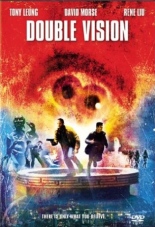
 If Seven had more of a supernatural bent and was heavily steeped in Asian culture, it might look like Double Vision, a superb serial killer effort from Hong Kong and Taiwan. The killer first strikes when a CEO is discovered in his office dead from drowning, yet with no signs of water to be found. Later, a senator’s mistress is burned to death in her apartment, but with no indication of fire present.
If Seven had more of a supernatural bent and was heavily steeped in Asian culture, it might look like Double Vision, a superb serial killer effort from Hong Kong and Taiwan. The killer first strikes when a CEO is discovered in his office dead from drowning, yet with no signs of water to be found. Later, a senator’s mistress is burned to death in her apartment, but with no indication of fire present.
Troubled cop Tony Leung (Red Cliff) is baffled, as is the rest of the force, so they call on the expertise of American FBI agent David Morse for help. What they discover in their investigation proves more complicated than anything they’ve encountered in their work before.
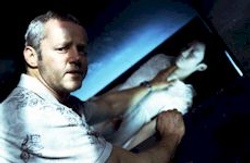 The reveal of the killer proves to be anticlimactic, but then the film makes up for it by throwing a huge, steel-plated monkey wrench into the plot that really shakes things up – something I would never expect. The last act isn’t as good as the setup since the focus shifts from suspenseful to spiritual, but Chen Kuo Fu’s film as a whole is extremely well-crafted and anchored by two solid leads. —Rod Lott
The reveal of the killer proves to be anticlimactic, but then the film makes up for it by throwing a huge, steel-plated monkey wrench into the plot that really shakes things up – something I would never expect. The last act isn’t as good as the setup since the focus shifts from suspenseful to spiritual, but Chen Kuo Fu’s film as a whole is extremely well-crafted and anchored by two solid leads. —Rod Lott


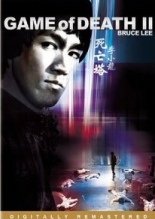
 I’ve never seen anything quite like
I’ve never seen anything quite like 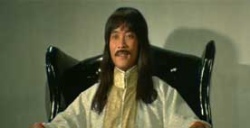 That’s when things get crazy. Like my favorite scene, when Billy is sucking face with a fully naked skank. She tries to kill him, the lights go out, and a lion (obviously a guy in a suit) bursts through the wall and chases them around the room. Read that sentence again and let it sink in. I also dug the finale, which takes place in the underground “tower of death,” a high-tech, booby-trapped, spy-type lair that suggests the film is a cut-rate
That’s when things get crazy. Like my favorite scene, when Billy is sucking face with a fully naked skank. She tries to kill him, the lights go out, and a lion (obviously a guy in a suit) bursts through the wall and chases them around the room. Read that sentence again and let it sink in. I also dug the finale, which takes place in the underground “tower of death,” a high-tech, booby-trapped, spy-type lair that suggests the film is a cut-rate 
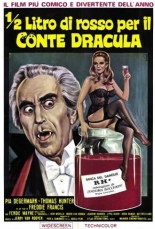
 All this culminates in quite the swingin’ party-cum-orgy where the guest of honor is none other than Count Dracula himself (Ferdy Mayne,
All this culminates in quite the swingin’ party-cum-orgy where the guest of honor is none other than Count Dracula himself (Ferdy Mayne,